- Home
- Danielle Collins
Lights Out at the Lighthouse
Lights Out at the Lighthouse Read online
Lights Out at the Lighthouse
Hearts Grove Cozy Mystery, Book 3
Danielle Collins
Fairfield Publishing
Copyright © 2019 Fairfield Publishing
ALL RIGHTS RESERVED. Except for review quotes, this book may not be reproduced, in whole or in part, without the written consent of the author.
This story is a work of fiction. Any resemblance to actual people, places, or events is purely coincidental.
Contents
Chapter 1
Chapter 2
Chapter 3
Chapter 4
Chapter 5
Chapter 6
Chapter 7
Chapter 8
Chapter 9
Chapter 10
Chapter 11
Chapter 12
Chapter 13
Chapter 14
Thank You!
1
Henrietta Hewitt sat down with a gentle huff of breath. For the slow season, she sure had a lot of work to do. Her gaze trailed around the room, taking in each upset antique or moved treasure. Her shop was almost never in this type of disarray, but today it was unavoidable.
“I think that’s the last of them,” Olivia said, dusting off her hands after she’d hung up the rest of the antique clothing they typically kept in an alcove area near the back of the shop.
“We have more than I thought,” Henrietta said, appraising the two full clothing racks of dresses, suitcoats, furs, and even a few ball gowns.
“Are we using them all?”
“No.” Henrietta picked out an elegant gown in a deep burgundy. “A few are either too valuable or too fragile to be rented out. But the rest should do nicely. I’ll go through and take out what we should keep here, and then you can list them on the website.”
“Sounds like a plan. Until then, I’ll get back to that stack of books we just got in yesterday.”
“Thank you, dear.” Henrietta smiled at her assistant, whose short hair and slightly bohemian style only scratched the surface of her kind and caring nature. Olivia was always ready and willing to help with anything the shop may need, and did so with a cheery smile. She was an asset Henrietta could not think of losing.
She watched Olivia head back to the small room behind the counter, where there was a stack of books waiting to be catalogued and priced. Preparations for the town’s Valentine’s Dance on Valentine’s Day had consumed them both for most of the morning, but they still had normal shop business to attend to.
Henrietta was happy that the city council had voted to make the theme A Very Victorian Valentine’s. It not only gave a fun focus to the night, but it also allowed her shop to be a central figure at the dance. The only problem with that was the work involved.
Not one to shy away from difficult tasks, Henrietta had agreed immediately to decorate the dance hall with items from her shop, as well as a few larger pieces she’d sold to local residents, confident they would be honored to have them featured in such a fun environment. The trick was doing so in a tasteful but safe way for the antiques.
She and Olivia had gone to the dance hall that morning and taken stock of the situation. The promising nature of the space allowed Henrietta to breathe easier, realizing that they would be able to set up intimate settings for some of the higher-priced items that could be roped off from public interaction, but that there were other areas where her replicas could be used for actual seating.
She realized it was a risk, allowing furniture from her shop to be used when food was involved, but she was willing to take it with the hope that the possible business from the night would be worth it—not to mention the historical education she hoped the attendees gained. Then again, perhaps her expectations were too high.
“Oh, Henrietta?” Olivia said, coming back into the main room. “I was wondering…”
When she didn’t continue, Henrietta looked up from the first rack of clothing she was cataloguing. “Yes?”
“Are you…going to the dance?”
Henrietta’s eyebrows rose. “I…I’m not sure. Why?”
“It sounds like a lot of fun. You know, the whole idea of a Victorian-inspired dance. People dressing up. Vintage decorations. The works. It sounds like something I…well, we would like.”
Henrietta smiled at her inclusion of them both. It did sound right up their alley, but she had a feeling that the young woman was asking about more than just their stance as lovers of history.
“I hadn’t really decided. Are you going?”
“Oh, probably not,” she said, her shoulders slumping. “Nelson hates dances of all kinds. Says he’d rather break his gaming fingers than go to one. That’s when you know it’s serious.”
Henrietta bristled at this. Nelson Stern, the man Olivia had met online and moved to Hearts Grove for, continued to under-impress her. While she wanted to think the best of him, he simply made choices she didn’t agree with. One being putting himself—and his love of video games—before his care for his girlfriend.
“That’s a shame, my dear.” She considered her next words carefully. “Then again, you don’t need him to come with you to attend.”
“True,” she said, drawing the word out.
Henrietta wondered if she was thinking about the falling-out they’d had only a few months before. Olivia had almost broken up with Nelson but had changed her mind at the last minute, his pleading having an effect on her conscience.
“I may attend,” Henrietta consented, knowing it would help the situation, “and if so, you are welcome to be my date.”
Olivia laughed. “I have a feeling you won’t be needing a date.”
Henrietta opened her mouth to ask what she meant by that, but then the front door opened and the sound of chimes rang through the Victorian house turned shop.
“You ready, Henri?” a gruff voice called out. Ralph Gershwin, head of Gershwin Private Investigators, popped his head around the corner. He insisted on calling her Henri despite her protests, and by now Henrietta had simply given in to it.
“Isn’t that a welcome,” she said, sending a faux disappointed face toward Olivia, who laughed.
“My apologies,” Ralph said, coming into the cramped space. “Hello, Madame. Are you quite ready to attend a luncheon with me?” He affected his best British accent, making both women laugh.
“Quite,” Henrietta replied with a slight bow.
“Smashing! But really,” he dropped the accent, “I’m starved.”
“Of course you are.” Henrietta turned back to Olivia. “I’m just going to leave these racks here. Anyone complains, you tell them it’s for the good of the dance. I’ll be back in an hour or so and will photograph these for you to upload.”
“Sounds perfect. Have a good lunch.” She waved them off as Henrietta picked up her jacket and purse.
“This way, if you will,” Ralph said, accent back in place. He extended his arm with a wily grin.
“Why thank you, sir.”
“My pleasure, indeed.”
Henrietta took a bite of her French dip and closed her eyes to savor the taste. They were at a small diner on the edge of town that Ralph occasionally went to when he had a hankering for clam chowder, as he did today. He dug his rounded soup spoon into the creamy liquid, and she saw the contentment on his handsome features at the first bite.
“Nothing beats this clam chowder. Nothing at all.”
“I’m glad to hear it.” She took another bite of her sandwich. It was nice to have something hot on a cold, dreary day.
“You know what, though?” He spooned another bite.
“What’s that?”
“It’s been so slow, I’m about ready to throw in the towel.”
/> She met his gaze. “I don’t believe that for an instant.”
“Okay, so maybe not completely, but I’m going out of my mind.” He shook his head, his salt-and-pepper hair flopping with the motion. “We’ve had nothing. Absolutely nothing in the last few weeks.”
“Isn’t that a good thing?” she observed. “I mean, no crime means no business for you, but…no crime.”
“When you put it like that, I sound like a heel,” he admitted. “But still, it’s been so boring.” He drew out the word, and she laughed.
“You sound like a four-year-old, Ralph.”
“I take that back,” he continued, ignoring her slight. “We had a widower ask us to find her keys. Keys, Henri. Like we were some two-bit detective agency.”
“Did you find the keys?”
“Of course, we did,” he said, a smile surfacing. “But it’s the principle of the matter. Things have to pick up soon or…”
“Or what?”
“I don’t know.” Being a retired police detective, Henrietta knew that Ralph was used to having a load of cases going at the same time. He didn’t take well to downtime.
“Something will come up. It always does.”
Her observation only made him scowl into his bowl of chowder.
“You could help me decorate for the dance,” she said with a laugh.
“Decorate? You’ve got the wrong guy.” He held up his hands in protest. “Trust me. You don’t want me anywhere near decorations. For anything.”
“Perhaps you need a hobby then, Mr. Gershwin.”
“Hobby? I have a hobby—it’s called my job as a private investigator. I just need things to investigate, is all.”
“What about stamp collecting?” she mused, pretending not to hear him. “Or maybe you’d prefer to collect coins?”
“Stamps? Coins? I’m not eighty.”
“Plenty of people under the age of eighty collect stamps and coins. I can assure you. I work with them on a regular basis.”
“I’m not starting a collection of any kind, Henri. End of discussion.”
“Mmm.”
“I know,” he said, a teasing glint shining in his eyes. “I could start writing.”
Her eyes snapped to his. “Writing?”
“Yeah. You know. Try my hand at the mystery business on the page rather than on foot. Could be real rewarding.” He leaned back, his hand going to his chin in thought. “I can see it now. A novel by Ralph Gershwin. It’s got a good ring to it.”
“You are not a writer,” she said, her nose turning up as she looked out the window.
“I’m just teasing,” he finally said, laughing. “I know that writing is your thing.”
She looked back at him with a tempered smile. “I had a feeling you were just trying to push my buttons.”
“Speaking of—how is the book coming?”
“Which one?” She let out a dramatic sigh. “The one that I love, the book of my heart, has been torn to shreds by so many, it may never see the light of day. But,” she looked around to make sure they couldn’t be overheard. “I will admit to you, and you alone, that I have started a mystery novel.”
“You don’t say!” Ralph looked genuinely excited.
“Yes. I took your advice to heart and started jotting down some ideas from that first case we worked on.”
“It’s about a missing person?”
“A young boy—can’t have it being too close to real life, you know. I have Cybil’s interests to look out for.”
“Naturally.” He scraped up the last mouthful of his chowder. “When can I read it?”
Henrietta felt the natural tightening in the pit of her stomach at the thought of others reading her work. For some reason, she’d been less worried about others reading her first book, a work of literary fiction that chronicled the life of a young woman making a journey along the Appalachian Trail. She’d poured her heart into it, but the response had been less than desirable.
When she’d had the idea to start a mystery, or more accurately Ralph had suggested it, she’d turned him down. But then the idea began to grow on her. She liked reading mysteries and even solving real-life ones. Why not write about them?
All of this made her increasingly hesitant about sharing her work. She enjoyed the process and loved writing, but would the response be the same as her other novel? As a strong, confident woman, she found that there wasn’t much that rattled her. This, though, critique of her art, had the power to do just that.
“I’ll let you know.”
“Hold on, now.” Ralph leaned forward, his elbows moving to the tabletop. “It was my idea for you to start a mystery; doesn’t that entitle me to read it first?”
“I’ll think about it.”
He narrowed his eyes at her tight-lipped smile but nodded once. “An artist is entitled to her privacy, I suppose.”
“Not to mention I’m very busy. I’m not sure when I’ll get the time to write again anytime soon.”
“That’s fair. This dance is really taking a toll on your social life, eh?”
“In a way. But…does this mean you won’t consider ‘dance decoration’ on the list of your hobbies?”
“Positive. But,” he looked down at his bowl, then out the window, then back at her. If it were anyone else she would have thought Ralph was nervous, but what did he have to be nervous about with her? “I was wondering if maybe—”
“Ralph Gershwin,” a thin, light voice said.
Ralph and Henrietta turned to the end of their table to see a frail, older woman holding a cane and a large purse. Her glasses were big and round, magnifying her eyes.
“Uh, that’s me,” Ralph said. He sent a glance at Henrietta, but she could only shrug. She didn’t know the woman.
“I’m friends with Eunice. She said you were a dear and found her keys. Is it possible you can help me find mine?”
Henrietta looked from the older woman over to Ralph, impressed with his resolve to hold in the groan she knew he had to be attempting to contain.
“Sounds like you’ve got a case ahead of you,” she said, sliding to the edge of the booth. “I’ve got to get back to the shop. Thanks for lunch.” She flashed him a smile and received a look that stated loud and clear: You traitor!
With a wink, she was off and laughing to herself as she exited the diner.
2
Henrietta stretched her hands above her head and let out an unrestrained yawn. At her feet, Sepia the cat did figure-eights between her legs in an attempt to gain even more attention.
“Yes, I hear you and I see you. I’ll get you breakfast in just a moment. Can’t a woman have her peace in the morning?”
Her response only gained her more loud meowing from Sepia, and Henrietta set off to the small kitchen for the cat food. The floorboards creaked and she stifled another yawn. The upper story of the large Victorian that housed H.H. Antiques had been turned into a livable apartment with two bedrooms, a bathroom, and kitchenette. There was even outdoor access to the kitchen by way of a set of creaky old stairs. It wasn’t much, but it was functional as it was homey, which mattered the most to Henrietta.
After depositing the bowl of dry and wet cat food for Sepia, Henrietta made a quick trip downstairs to turn on the lower level heat and to retrieve the morning paper. Her slipper-clad feet smacked against the hardwood floors as she rushed back into her already-heated upstairs apartment.
“It’s going to be a chilly one, Sepia.” The cat didn’t move from her location in front of the food dish, but Henrietta had expected as much.
“Now, what do we have going on in the life of the town today?” she mused aloud.
After turning the coffee pot on, she sat down at the small kitchen table and slid the newspaper from its plastic sleeve. They were expecting more rain today, and she was glad to see her paper unspoiled.
As she unfolded the paper, she gasped at the headline.
Lighthouse Advocate Found Dead
She ignored the ping of the coff
ee as she stared at the photo of Gerald Folsom. She’d met him several times at town functions and in association with the historical committee for the town. He was an advocate for history and preservation, and she knew he’d worked at the lighthouse for years.
As she read on, the lack of details frustrated her. It didn’t sound as if anything had been determined yet, but the hint of suicide was there, and that unsettled Henrietta even more. While she wouldn’t admit to knowing Gerald well, she felt as if she could say she’d talked with him enough to see him as a happy person. A man who loved his job, loved the lighthouse, and would presumably desire to stay around to see the lighthouse fully restored.
Then again, no one could truly know the mind of anyone, unless they spent adequate time with them. Was it possible Gerald had suffered from depression?
Her stomach growling, Henrietta finally got up and poured herself a cup of coffee and a bowl of granola. When she reclaimed her seat at the table, she turned the page from the unsettling front-page news. It was too early in the morning to think about such sad things.
“I just can’t believe it. In this small community, news like this doesn’t usually make the front page. At least, I haven’t seen it since I moved here.” Olivia was at the shop’s computer, uploading photos of the clothing that Henrietta had taken the day before. They would have them for lease on the website for the night of the dance.
“It is very sad and quite depressing to wake up to,” Henrietta admitted. “I suppose it’s just the biggest story they could find at the time of printing.”
“But around Valentine’s Day? Couldn’t they put it a little further back?”
“They are trying to sell papers, Olivia,” Henrietta pointed out. “I dare say the newspaper thinks less of tact and more of sales numbers.”

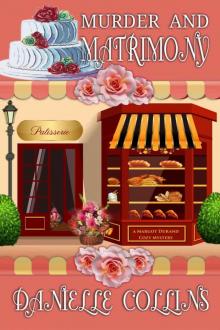 Murder and Matrimony
Murder and Matrimony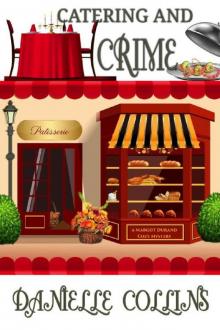 Catering and Crime
Catering and Crime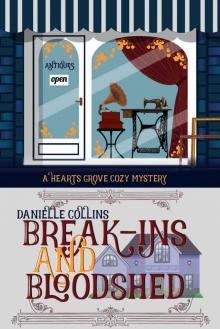 Break-ins and Bloodshed
Break-ins and Bloodshed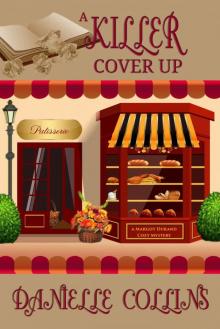 A Killer Cover Up
A Killer Cover Up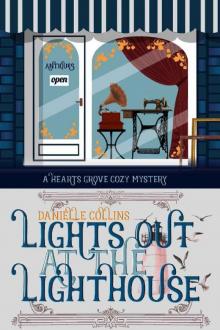 Lights Out at the Lighthouse
Lights Out at the Lighthouse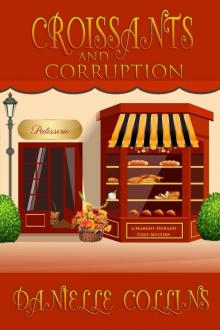 Croissants and Corruption: A Margot Durand Cozy Mystery
Croissants and Corruption: A Margot Durand Cozy Mystery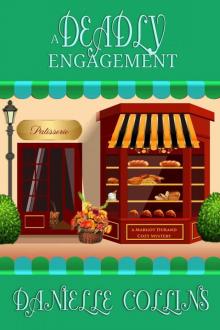 A Deadly Engagement (Margot Durand Cozy Mystery Book 9)
A Deadly Engagement (Margot Durand Cozy Mystery Book 9)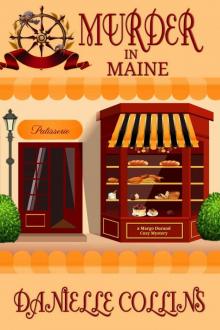 Murder in Maine (Margot Durand Cozy Mystery Book 7)
Murder in Maine (Margot Durand Cozy Mystery Book 7)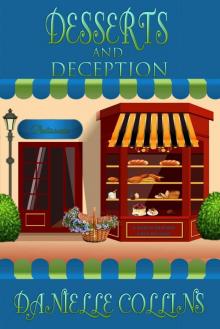 Desserts and Deception: A Margot Durand Cozy Mystery
Desserts and Deception: A Margot Durand Cozy Mystery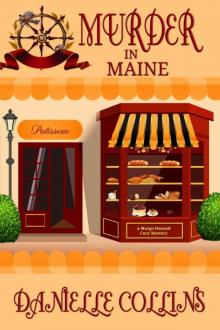 Murder in Maine
Murder in Maine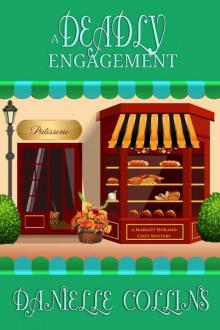 A Deadly Engagement
A Deadly Engagement Bakeries and Bodies
Bakeries and Bodies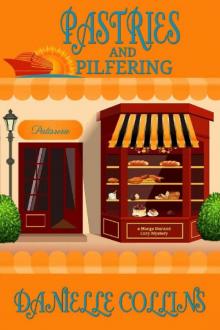 Pastries and Pilfering
Pastries and Pilfering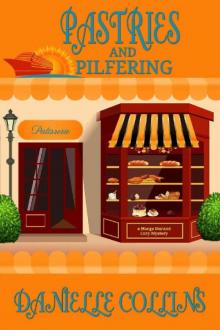 Pastries and Pilfering: A Margot Durand Cozy Mystery
Pastries and Pilfering: A Margot Durand Cozy Mystery Bakeries and Bodies (Margot Durand Cozy Mystery Book 8)
Bakeries and Bodies (Margot Durand Cozy Mystery Book 8)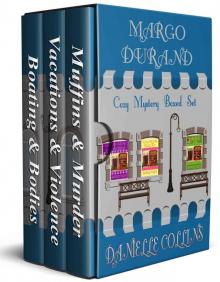 Margot Durand Cozy Mystery Boxed Set: Books 4 - 6
Margot Durand Cozy Mystery Boxed Set: Books 4 - 6